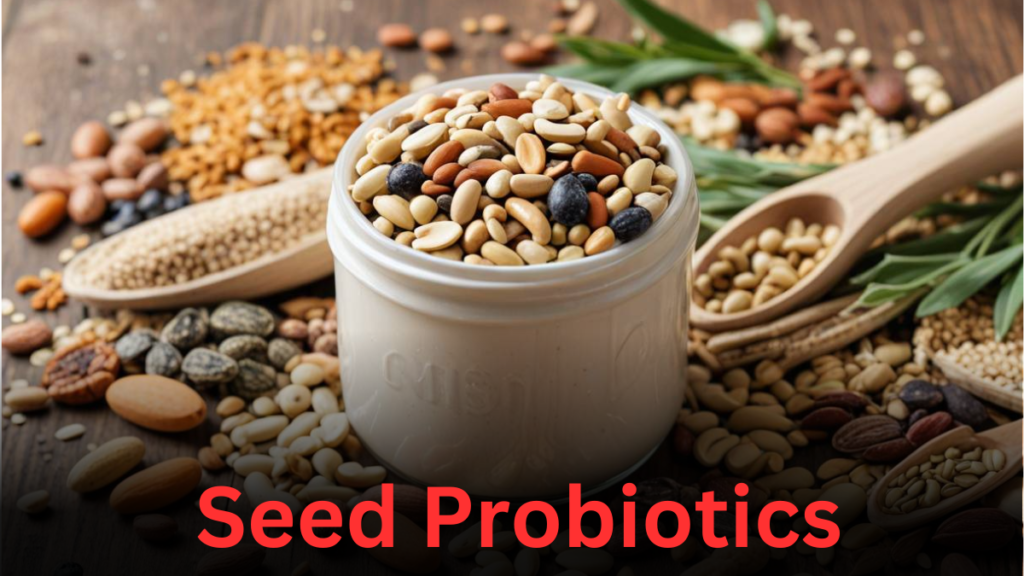Review Of Seed Probiotics
In the forever-changing landscape of health and wellbeing, seed probiotics happen to be one of the most current groundbreaking innovations. These small powerhouses of seeds provide a plethora of benefits in gut health, digestion, and overall wellness. Throughout this blog, we will delve deep into seed probiotics: exploring their origin, their benefits, and their applications, and why they might just be the next big thing in health supplements.
What Are Seed Probiotics?

Seed probiotics are probiotic strains that originate from the seeds of plants. These seeds, when used, are usually full of natural fibers and beneficial microorganisms that get processed to utilize their full probiotic potential. Unlike other traditional types of probiotics, those usually originating from fermented foods or dairy, seed probiotics offer a plant-based alternative for people who want to achieve good gut health.
Origins of Seed Probiotics
The concept of seed probiotics evolves from the idea that seeds contain useful microorganisms and prebiotic fibers that foster gut health. Seeds such as flax, chia, and pumpkin are rich in fiber, antioxidants, and essential fatty acids, which make them a good source for probiotics. The fermentation process in seed probiotics enhances these benefits to become so powerful for any health regimen.
Science Behind the Seed Probiotics

Fermented seed probiotics are a product of the fermentation process that naturally enhances the seeds’ innate probiotic potentials. During the fermentation process, the seeds get degraded by the helpful bacteria into probiotic strains that may help in maintaining good gut microbiota. The fermentation process increases their bioavailability, making digestion and the absorption of key vitamins and minerals easier.
The rise of seed probiotics in the sphere of health and wellness does not come out of thin air. These powerful supplements offer multiple benefits that support overall health and well-being. Here is a closer look at some of the key advantages:
Improved Digestive Health
One of the most salient benefits of seed probiotics is the facilitation of digestive health. The positive bacteria that arise from fermentation serve to maintain a healthy balance in gut microbiota, which is important for good digestion. This balance can alleviate some general digestive problems such as bloating, gas, and constipation.
Improved Nutrient Absorption
Seed probiotics have the added advantages of maintaining a healthy gut and even facilitating improved nutrient absorption. The bioavailability of important nutrients contained in the seeds, such as omega-3 fatty acids, fiber, and antioxidants, gets improved through the process of fermentation. Therefore, these nutrients will be used in better ways inside your body for improved health benefits.
Immune System Support

A healthy gut can simply mean a healthy immune system. Seed probiotics support the health of your gut and, in turn, help you strengthen your immune system. Such probiotics contain beneficial bacteria that modulate immune responses toward a state of balance, hence preventing infections and diseases.
Anti-Inflammatory Properties
Chronic inflammation is at the root of many diseases: digestive disorders, autoimmune diseases. Anti-inflammatory properties were noted in seed probiotics; reducing inflammation both in the gut and the body. This action has been shown to improve overall health and well-being.
Balanced Mood and Mental Health
Recent research has drawn a link between gut and brain health. Seed probiotics could fall into this category because supporting healthy gut bacteria may affect mood stability and reduce symptoms of anxiety and depression.
Variants of Seed Probiotics
Indeed, there are many kinds of seeds that have been identified to contain probiotic properties, due to the different benefits they proffer. Among these stands out the following:
Flax Seeds
These are rich in omega-3 fatty acids, fiber, and lignans. They are also highly recognized for their various benefits to be facilitative in the digestive process, enhancing heart health. Seed probiotics from flax seeds could enhance such benefits by allowing for a healthy gut microbiome.
Chia Seeds
Another popular choice for seed probiotics includes chia seeds. Chia seed probiotics are rich in fiber, antioxidants, and essential fatty acids that help in promoting digestive health, facilitating weight management, and representing a blend of nutrients.
Pumpkin Seeds
Pumpkin seeds, popularly known as pepitas, contain a high amount of protein, magnesium, and zinc. The seed probiotics made from pumpkin seeds help in increasing immune function, regulating sleep patterns, and generally contributing to overall well-being.
Sunflower Seeds
Sunflower seeds are a good source of vitamin E, magnesium, and selenium. They are antioxidant-enabling, heart-healthy foods. Seed probiotics made from sunflower seeds will heighten these attributes by enabling gut health and enhancing nutrient absorption.
How to Take Seed Probiotics into Your Diet

Adding seed probiotics to your diet is so easy and will offer real benefits. Here are just some practical tips to get you going with the habit of adding them into your daily routine.
Smoothies and Shakes
It’s easy to add seed probiotics to your smoothies and shakes. In this regard, adding a tablespoon of flax, chia, or pumpkin seeds into your favorite smoothie recipe adds a boost of probiotics and nutrients.
Salads and Bowls
Sprinkle seed probiotics over salads, grain bowls, or yogurt for added crunch and nutrition. What this does is adds flavor, texture, and a healthy dose of probiotics.
Baking and Cooking
Add seed probiotics to baked goods, like muffins and breads, or mix them into granola for a nutritious boost that doesn’t affect flavor.
Supplement Form
If you want a more highly concentrated serving of seed probiotics, you may consider supplement form. Supplements are available in capsule, powder, and tincture forms, making it fairly easy to add them to your lifestyle.
Choosing the Seed Probiotic

When choosing a seed probiotic, several factors are necessary for consideration in order to enable you to obtain a quality product:
Source and Quality
Seed probiotics must be from good manufacturers with no contamination issues. Prefer organic seeds and quality control that would help in formulating the product.
Probiotic Strains
Different seed probiotics have different strains of viable bacteria. Look up the strains used in the product and choose one that corresponds with and helps your health need.
Dosage and Potency
Check out the dosage and potency of the seed probiotic to make sure that it will meet your needs. To achieve optimal results, take the recommended dosage amount as stated on the product label.
Additional Ingredients
Be aware of the added ingredients involved in this seed probiotic supplement. Ensure that as few additives and fillers are used in the product as possible, so you get a purer form of the probiotic.
Conclusion

Seed probiotics represent a new frontier in gut health and wellness. By harnessing the natural benefits of seeds and the power of fermentation, these probiotics offer a plant-based alternative to traditional probiotic sources. Yet, with the added benefits of improved digestion, nutrient absorption, and immune function, taking seed probiotics brings a huge amount of value into any health regimen. From incorporating into one’s diet through seeds and supplements to embracing seed probiotics, which opens the doorway to a much healthier balance in one’s life.
FAQ on Seed Probiotics
What Are Seed Probiotics?
Seed probiotics are probiotics derived from seeds, which are rich in natural fibers and microorganisms. These seeds are fermented to enhance their probiotic potential, offering a plant-based alternative to traditional probiotics.
Where to Buy Seed Probiotics?
You can purchase seed probiotics from health food stores, online retailers, and specialized supplement shops. Ensure to choose reputable suppliers to guarantee quality and effectiveness.
Seed Probiotics Review
Seed probiotics are often praised for their natural, plant-based benefits. Reviews generally highlight their effectiveness in improving digestive health, nutrient absorption, and overall well-being.
Seed Probiotics Side Effects
While seed probiotics are generally considered safe, some individuals might experience mild digestive discomfort, such as bloating or gas. If any adverse effects persist, consult with a healthcare professional.
Seed Probiotics Ingredients
Common ingredients in seed probiotics include flax seeds, chia seeds, pumpkin seeds, and sunflower seeds. These seeds are often combined with natural fermentation agents to enhance their probiotic properties.
When to Take Seed Probiotics?
The best time to take seed probiotics can vary based on personal preference and the specific supplement. Generally, it is recommended to take them with meals to aid digestion and absorption.
How to Take Seed Probiotics?
You can incorporate seed probiotics into your diet by adding them to smoothies, salads, and baked goods. They are also available in supplement form, such as capsules or powders.
Seed Probiotics Constipation
Seed probiotics can help alleviate constipation by promoting a healthy balance of gut bacteria and improving digestive function. Increasing fiber intake from seeds may also contribute to regular bowel movements.
Seed Probiotics Before and After
Using seed probiotics before and after meals can support digestive health and improve nutrient absorption. Their effects may vary, so it’s important to follow the recommended dosage and observe how they work for you.
Ingredients in Seed Probiotics
Ingredients typically include fermented seeds like flax, chia, and pumpkin. These ingredients are rich in fiber, omega-3 fatty acids, and antioxidants, contributing to their probiotic benefits.
Reviews on Seed Probiotics
Most reviews on seed probiotics highlight their benefits for digestive health and overall wellness. Users appreciate their natural origin and effectiveness compared to traditional probiotics.
Seed Probiotics Instructions
Follow the instructions provided with your seed probiotics supplement for optimal use. This includes dosage recommendations and any specific instructions for consumption.
Seed Probiotics and Pregnancy
Consult with a healthcare provider before using seed probiotics during pregnancy to ensure they are safe and beneficial for both mother and baby.



Pingback: Purple Sweet Potato Recipes: 7 Tasty and Healthy Ways to Consume Them - Solvinsight